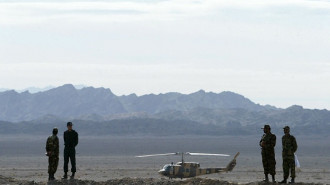Islamic State group release photo showing Russia plane 'bomb'
The Islamic State group has said it smuggled a bomb disguised as a soft drink on board a Russian airliner, which crashed last month killing all 224 passengers.
IS said in their online magazine that the terror attack was launched after discovering a "way to compromise the security" at an Egyptian airport.
The latest edition of its official online magazine Dabiq said IS had initially planned to down a plane belonging to a country from the US-led coalition targeting militants in Iraq and Syria.
|
— Yury Barmin (@yurybarmin) November 18, 2015" style="color:#fff;" class="twitter-post-link" target="_blank">Twitter Post
|
The militants decided to instead target the Russian plane departing the Red Sea resort of Sharm el-Sheikh after Moscow began an air campaign in Syria in late September, the magazine said.
IS has previously made claims that they blew up the aircraft but said they would reveal details when "the time was right".
UK security services had already claimed that the Russian plane was downed by IS.
Earlier on Wednesday, Russia's security chief Alexander Bortnikov told President Vladimir Putin that the passenger jet was brought down shortly after take-off by a home-made bomb containing explosives of "foreign production" with a force equivalent to one kilo of TNT.
"According to our experts, a homemade explosive device equivalent to one kilogram of TNT went off onboard, which caused the plane to break up in the air," Bortnikov added.
"[This] explains why the fuselage was scattered over such a large territory," Bortnikov said."We can say unequivocally that this was a terrorist attack."
Putin pledged to ramp up Moscow's bombing campaign in Syria in response to the attack but stopped short of blaming any one group as the country's security agency announced a $50 million (47 million-euro) reward for information leading to capture of those responsible.

![Palestinians mourned the victims of an Israeli strike on Deir al-Balah [Getty]](/sites/default/files/styles/image_684x385/public/2024-11/GettyImages-2182362043.jpg?h=199d8c1f&itok=xSHZFbmc)


![The law could be enforced against teachers without prior notice [Getty]](/sites/default/files/styles/image_684x385/public/2178740715.jpeg?h=a5f2f23a&itok=hnqrCS4x)
 Follow the Middle East's top stories in English at The New Arab on Google News
Follow the Middle East's top stories in English at The New Arab on Google News
![Fakhrizadeh [AFP] Fakhrizadeh [AFP]](/sites/default/files/styles/image_330x185/public/media/images/774C39F7-8F7A-4D67-B998-27D102FCB4A7.png?h=d1cb525d&itok=j9eGvunV)

